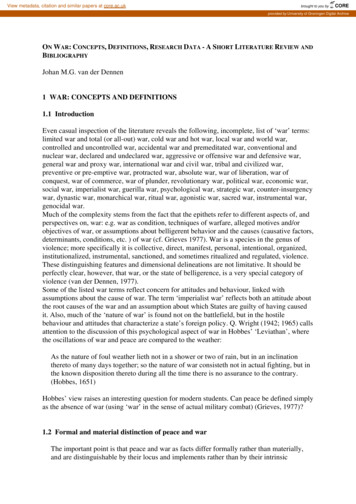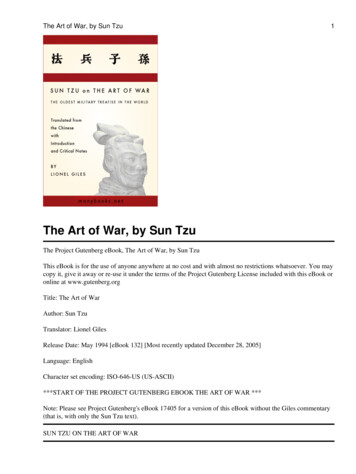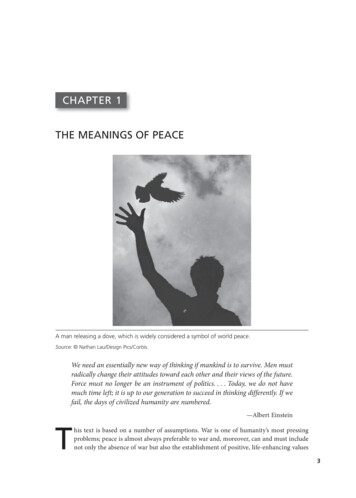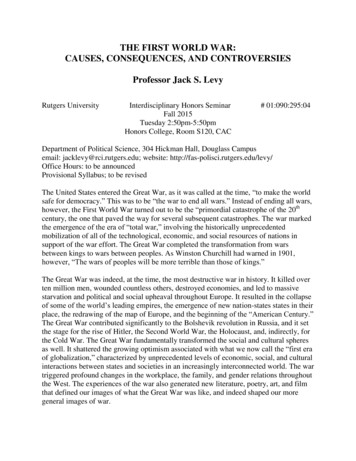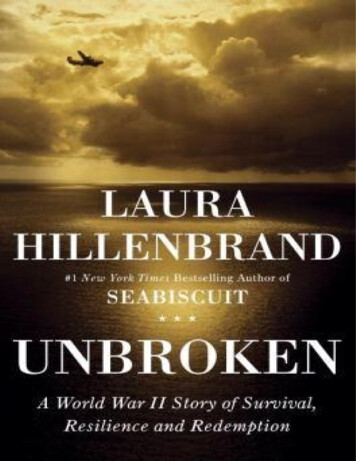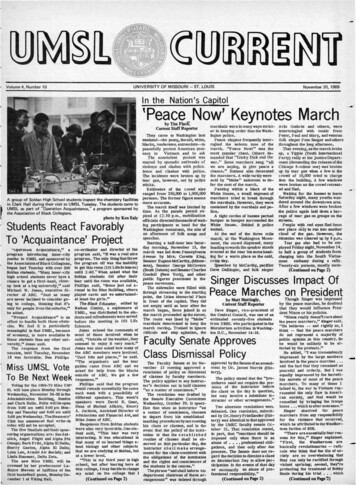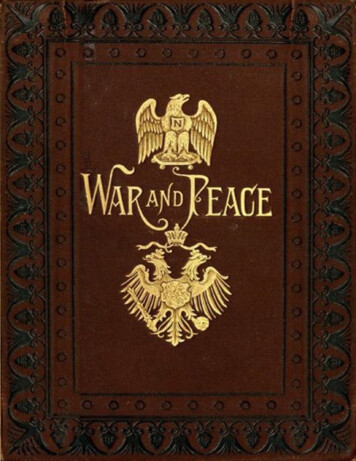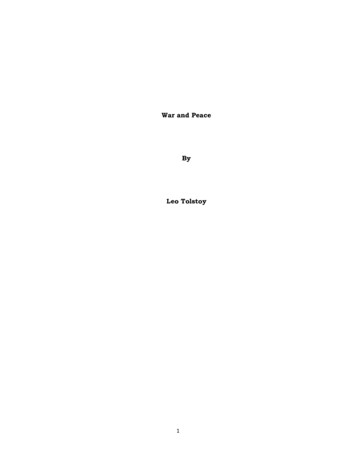
Transcription
War and PeaceByLeo Tolstoy1
WAR AND PEACEBy Leo Tolstoy/TolstoiBOOK ONE: 1805CHAPTER I"Well, Prince, so Genoa and Lucca are now just family estates of theBuonapartes. But I warn you, if you don't tell me that this means war,if you still try to defend the infamies and horrors perpetrated by thatAntichrist--I really believe he is Antichrist--I will have nothing moreto do with you and you are no longer my friend, no longer my 'faithfulslave,' as you call yourself! But how do you do? I see I have frightenedyou--sit down and tell me all the news."It was in July, 1805, and the speaker was the well-known Anna PavlovnaScherer, maid of honor and favorite of the Empress Marya Fedorovna. With2
these words she greeted Prince Vasili Kuragin, a man of high rank andimportance, who was the first to arrive at her reception. Anna Pavlovnahad had a cough for some days. She was, as she said, suffering from lagrippe; grippe being then a new word in St. Petersburg, used only by theelite.All her invitations without exception, written in French, and deliveredby a scarlet-liveried footman that morning, ran as follows:"If you have nothing better to do, Count (or Prince), and if theprospect of spending an evening with a poor invalid is not too terrible,I shall be very charmed to see you tonight between 7 and 10--AnnetteScherer.""Heavens! what a virulent attack!" replied the prince, not in theleast disconcerted by this reception. He had just entered, wearing anembroidered court uniform, knee breeches, and shoes, and had stars onhis breast and a serene expression on his flat face. He spoke in thatrefined French in which our grandfathers not only spoke but thought, andwith the gentle, patronizing intonation natural to a man of importancewho had grown old in society and at court. He went up to Anna Pavlovna,kissed her hand, presenting to her his bald, scented, and shining head,and complacently seated himself on the sofa."First of all, dear friend, tell me how you are. Set your friend's mindat rest," said he without altering his tone, beneath the politenessand affected sympathy of which indifference and even irony could be3
discerned."Can one be well while suffering morally? Can one be calm in times likethese if one has any feeling?" said Anna Pavlovna. "You are staying thewhole evening, I hope?""And the fete at the English ambassador's? Today is Wednesday. I mustput in an appearance there," said the prince. "My daughter is coming forme to take me there.""I thought today's fete had been canceled. I confess all thesefestivities and fireworks are becoming wearisome.""If they had known that you wished it, the entertainment would have beenput off," said the prince, who, like a wound-up clock, by force of habitsaid things he did not even wish to be believed."Don't tease! Well, and what has been decided about Novosiltsev'sdispatch? You know everything.""What can one say about it?" replied the prince in a cold, listlesstone. "What has been decided? They have decided that Buonaparte hasburnt his boats, and I believe that we are ready to burn ours."Prince Vasili always spoke languidly, like an actor repeating a stalepart. Anna Pavlovna Scherer on the contrary, despite her forty years,overflowed with animation and impulsiveness. To be an enthusiast had4
become her social vocation and, sometimes even when she did notfeel like it, she became enthusiastic in order not to disappoint theexpectations of those who knew her. The subdued smile which, though itdid not suit her faded features, always played round her lips expressed,as in a spoiled child, a continual consciousness of her charming defect,which she neither wished, nor could, nor considered it necessary, tocorrect.In the midst of a conversation on political matters Anna Pavlovna burstout:"Oh, don't speak to me of Austria. Perhaps I don't understand things,but Austria never has wished, and does not wish, for war. She isbetraying us! Russia alone must save Europe. Our gracious sovereignrecognizes his high vocation and will be true to it. That is the onething I have faith in! Our good and wonderful sovereign has to performthe noblest role on earth, and he is so virtuous and noble that God willnot forsake him. He will fulfill his vocation and crush the hydra ofrevolution, which has become more terrible than ever in the person ofthis murderer and villain! We alone must avenge the blood of the justone. Whom, I ask you, can we rely on?. England with her commercialspirit will not and cannot understand the Emperor Alexander's loftinessof soul. She has refused to evacuate Malta. She wanted to find,and still seeks, some secret motive in our actions. What answer didNovosiltsev get? None. The English have not understood and cannotunderstand the self-abnegation of our Emperor who wants nothing forhimself, but only desires the good of mankind. And what have they5
promised? Nothing! And what little they have promised they will notperform! Prussia has always declared that Buonaparte is invincible, andthat all Europe is powerless before him. And I don't believe aword that Hardenburg says, or Haugwitz either. This famous Prussianneutrality is just a trap. I have faith only in God and the loftydestiny of our adored monarch. He will save Europe!"She suddenly paused, smiling at her own impetuosity."I think," said the prince with a smile, "that if you had been sentinstead of our dear Wintzingerode you would have captured the King ofPrussia's consent by assault. You are so eloquent. Will you give me acup of tea?""In a moment. A propos," she added, becoming calm again, "I am expectingtwo very interesting men tonight, le Vicomte de Mortemart, who isconnected with the Montmorencys through the Rohans, one of the bestFrench families. He is one of the genuine emigres, the good ones. Andalso the Abbe Morio. Do you know that profound thinker? He has beenreceived by the Emperor. Had you heard?""I shall be delighted to meet them," said the prince. "But tell me," headded with studied carelessness as if it had only just occurred to him,though the question he was about to ask was the chief motive of hisvisit, "is it true that the Dowager Empress wants Baron Funke to beappointed first secretary at Vienna? The baron by all accounts is a poorcreature."6
Prince Vasili wished to obtain this post for his son, but others weretrying through the Dowager Empress Marya Fedorovna to secure it for thebaron.Anna Pavlovna almost closed her eyes to indicate that neither she noranyone else had a right to criticize what the Empress desired or waspleased with."Baron Funke has been recommended to the Dowager Empress by her sister,"was all she said, in a dry and mournful tone.As she named the Empress, Anna Pavlovna's face suddenly assumed anexpression of profound and sincere devotion and respect mingled withsadness, and this occurred every time she mentioned her illustriouspatroness. She added that Her Majesty had deigned to show Baron Funkebeaucoup d'estime, and again her face clouded over with sadness.The prince was silent and looked indifferent. But, with the womanly andcourtierlike quickness and tact habitual to her, Anna Pavlovna wishedboth to rebuke him (for daring to speak he had done of a man recommendedto the Empress) and at the same time to console him, so she said:"Now about your family. Do you know that since your daughter cameout everyone has been enraptured by her? They say she is amazinglybeautiful."7
The prince bowed to signify his respect and gratitude."I often think," she continued after a short pause, drawing nearer tothe prince and smiling amiably at him as if to show that politicaland social topics were ended and the time had come for intimateconversation--"I often think how unfairly sometimes the joys of life aredistributed. Why has fate given you two such splendid children? I don'tspeak of Anatole, your youngest. I don't like him," she added in a toneadmitting of no rejoinder and raising her eyebrows. "Two such charmingchildren. And really you appreciate them less than anyone, and so youdon't deserve to have them."And she smiled her ecstatic smile."I can't help it," said the prince. "Lavater would have said I lack thebump of paternity.""Don't joke; I mean to have a serious talk with you. Do you know I amdissatisfied with your younger son? Between ourselves" (and her faceassumed its melancholy expression), "he was mentioned at Her Majesty'sand you were pitied."The prince answered nothing, but she looked at him significantly,awaiting a reply. He frowned."What would you have me do?" he said at last. "You know I did all afather could for their education, and they have both turned out fools.8
Hippolyte is at least a quiet fool, but Anatole is an active one. Thatis the only difference between them." He said this smiling in a way morenatural and animated than usual, so that the wrinkles round his mouthvery clearly revealed something unexpectedly coarse and unpleasant."And why are children born to such men as you? If you were not a fatherthere would be nothing I could reproach you with," said Anna Pavlovna,looking up pensively."I am your faithful slave and to you alone I can confess that mychildren are the bane of my life. It is the cross I have to bear. Thatis how I explain it to myself. It can't be helped!"He said no more, but expressed his resignation to cruel fate by agesture. Anna Pavlovna meditated."Have you never thought of marrying your prodigal son Anatole?" sheasked. "They say old maids have a mania for matchmaking, and though Idon't feel that weakness in myself as yet, I know a little person who isvery unhappy with her father. She is a relation of yours, Princess MaryBolkonskaya."Prince Vasili did not reply, though, with the quickness of memory andperception befitting a man of the world, he indicated by a movement ofthe head that he was considering this information."Do you know," he said at last, evidently unable to check the sad9
current of his thoughts, "that Anatole is costing me forty thousandrubles a year? And," he went on after a pause, "what will it be in fiveyears, if he goes on like this?" Presently he added: "That's what wefathers have to put up with. Is this princess of yours rich?""Her father is very rich and stingy. He lives in the country. He is thewell-known Prince Bolkonski who had to retire from the army under thelate Emperor, and was nicknamed 'the King of Prussia.' He is very cleverbut eccentric, and a bore. The poor girl is very unhappy. She has abrother; I think you know him, he married Lise Meinen lately. He is anaide-de-camp of Kutuzov's and will be here tonight.""Listen, dear Annette," said the prince, suddenly taking Anna Pavlovna'shand and for some reason drawing it downwards. "Arrange that affair forme and I shall always be your most devoted slave-slafe with an f, asa village elder of mine writes in his reports. She is rich and of goodfamily and that's all I want."And with the familiarity and easy grace peculiar to him, he raised themaid of honor's hand to his lips, kissed it, and swung it to and fro ashe lay back in his armchair, looking in another direction."Attendez," said Anna Pavlovna, reflecting, "I'll speak to Lise, youngBolkonski's wife, this very evening, and perhaps the thing can bearranged. It shall be on your family's behalf that I'll start myapprenticeship as old maid."10
CHAPTER IIAnna Pavlovna's drawing room was gradually filling. The highestPetersburg society was assembled there: people differing widely in ageand character but alike in the social circle to which they belonged.Prince Vasili's daughter, the beautiful Helene, came to take her fatherto the ambassador's entertainment; she wore a ball dress and her badgeas maid of honor. The youthful little Princess Bolkonskaya, known as lafemme la plus seduisante de Petersbourg, * was also there. She had beenmarried during the previous winter, and being pregnant did not go toany large gatherings, but only to small receptions. Prince Vasili's son,Hippolyte, had come with Mortemart, whom he introduced. The Abbe Morioand many others had also come.* The most fascinating woman in Petersburg.To each new arrival Anna Pavlovna said, "You have not yet seen my aunt,"or "You do not know my aunt?" and very gravely conducted him or her toa little old lady, wearing large bows of ribbon in her cap, who had comesailing in from another room as soon as the guests began to arrive;and slowly turning her eyes from the visitor to her aunt, Anna Pavlovnamentioned each one's name and then left them.Each visitor performed the ceremony of greeting this old aunt whom not11
one of them knew, not one of them wanted to know, and not one of themcared about; Anna Pavlovna observed these greetings with mournful andsolemn interest and silent approval. The aunt spoke to each of them inthe same words, about their health and her own, and the health of HerMajesty, "who, thank God, was better today." And each visitor, thoughpoliteness prevented his showing impatience, left the old woman with asense of relief at having performed a vexatious duty and did not returnto her the whole evening.The young Princess Bolkonskaya had brought some work in agold-embroidered velvet bag. Her pretty little upper lip, on which adelicate dark down was just perceptible, was too short for her teeth,but it lifted all the more sweetly, and was especially charming when sheoccasionally drew it down to meet the lower lip. As is always the casewith a thoroughly attractive woman, her defect--the shortness of herupper lip and her half-open mouth--seemed to be her own special andpeculiar form of beauty. Everyone brightened at the sight of this prettyyoung woman, so soon to become a mother, so full of life and health, andcarrying her burden so lightly. Old men and dull dispirited young oneswho looked at her, after being in her company and talking to her alittle while, felt as if they too were becoming, like her, full of lifeand health. All who talked to her, and at each word saw her bright smileand the constant gleam of her white teeth, thought that they were in aspecially amiable mood that day.The little princess went round the table with quick, short, swayingsteps, her workbag on her arm, and gaily spreading out her dress sat12
down on a sofa near the silver samovar, as if all she was doing was apleasure to herself and to all around her. "I have brought my work,"said she in French, displaying her bag and addressing all present."Mind, Annette, I hope you have not played a wicked trick on me," sheadded, turning to her hostess. "You wrote that it was to be quite asmall reception, and just see how badly I am dressed." And she spreadout her arms to show her short-waisted, lace-trimmed, dainty gray dress,girdled with a broad ribbon just below the breast."Soyez tranquille, Lise, you will always be prettier than anyone else,"replied Anna Pavlovna."You know," said the princess in the same tone of voice and still inFrench, turning to a general, "my husband is deserting me? He is goingto get himself killed. Tell me what this wretched war is for?" sheadded, addressing Prince Vasili, and without waiting for an answer sheturned to speak to his daughter, the beautiful Helene."What a delightful woman this little princess is!" said Prince Vasili toAnna Pavlovna.One of the next arrivals was a stout, heavily built young man withclose-cropped hair, spectacles, the light-colored breeches fashionableat that time, a very high ruffle, and a brown dress coat. This stoutyoung man was an illegitimate son of Count Bezukhov, a well-knowngrandee of Catherine's time who now lay dying in Moscow. The young manhad not yet entered either the military or civil service, as he had only13
just returned from abroad where he had been educated, and this was hisfirst appearance in society. Anna Pavlovna greeted him with the nod sheaccorded to the lowest hierarchy in her drawing room. But in spite ofthis lowest-grade greeting, a look of anxiety and fear, as at the sightof something too large and unsuited to the place, came over her facewhen she saw Pierre enter. Though he was certainly rather bigger thanthe other men in the room, her anxiety could only have reference tothe clever though shy, but observant and natural, expression whichdistinguished him from everyone else in that drawing room."It is very good of you, Monsieur Pierre, to come and visit a poorinvalid," said Anna Pavlovna, exchanging an alarmed glance with her auntas she conducted him to her.Pierre murmured something unintelligible, and continued to look round asif in search of something. On his way to the aunt he bowed to the littleprincess with a pleased smile, as to an intimate acquaintance.Anna Pavlovna's alarm was justified, for Pierre turned away from theaunt without waiting to hear her speech about Her Majesty's health. AnnaPavlovna in dismay detained him with the words: "Do you know the AbbeMorio? He is a most interesting man.""Yes, I have heard of his scheme for perpetual peace, and it is veryinteresting but hardly feasible.""You think so?" rejoined Anna Pavlovna in order to say something and14
get away to attend to her duties as hostess. But Pierre now committeda reverse act of impoliteness. First he had left a lady before she hadfinished speaking to him, and now he continued to speak to another whowished to get away. With his head bent, and his big feet spread apart,he began explaining his reasons for thinking the abbe's plan chimerical."We will talk of it later," said Anna Pavlovna with a smile.And having got rid of this young man who did not know how to behave, sheresumed her duties as hostess and continued to listen and watch, readyto help at any point where the conversation might happen to flag. Asthe foreman of a spinning mill, when he has set the hands to work, goesround and notices here a spindle that has stopped or there one thatcreaks or makes more noise than it should, and hastens to check themachine or set it in proper motion, so Anna Pavlovna moved about herdrawing room, approaching now a silent, now a too-noisy group, and by aword or slight rearrangement kept the conversational machine in steady,proper, and regular motion. But amid these cares her anxiety aboutPierre was evident. She kept an anxious watch on him when he approachedthe group round Mortemart to listen to what was being said there, andagain when he passed to another group whose center was the abbe.Pierre had been educated abroad, and this reception at Anna Pavlovna'swas the first he had attended in Russia. He knew that all theintellectual lights of Petersburg were gathered there and, like a childin a toyshop, did not know which way to look, afraid of missing any15
clever conversation that was to be heard. Seeing the self-confident andrefined expression on the faces of those present he was always expectingto hear something very profound. At last he came up to Morio. Here theconversation seemed interesting and he stood waiting for an opportunityto express his own views, as young people are fond of doing.16
CHAPTER IIIAnna Pavlovna's reception was in full swing. The spindles hummedsteadily and ceaselessly on all sides. With the exception of the aunt,beside whom sat only one elderly lady, who with her thin careworn facewas rather out of place in this brilliant society, the whole company hadsettled into three groups. One, chiefly masculine, had formed round theabbe. Another, of young people, was grouped round the beautiful PrincessHelene, Prince Vasili's daughter, and the little Princess Bolkonskaya,very pretty and rosy, though rather too plump for her age. The thirdgroup was gathered round Mortemart and Anna Pavlovna.The vicomte was a nice-looking young man with soft features and polishedmanners, who evidently considered himself a celebrity but out ofpoliteness modestly placed himself at the disposal of the circle inwhich he found himself. Anna Pavlovna was obviously serving him up as atreat to her guests. As a clever maitre d'hotel serves up as a speciallychoice delicacy a piece of meat that no one who had seen it in thekitchen would have cared to eat, so Anna Pavlovna served up to herguests, first the vicomte and then the abbe, as peculiarly choicemorsels. The group about Mortemart immediately began discussing themurder of the Duc d'Enghien. The vicomte said that the Duc d'Enghien hadperished by his own magnanimity, and that there were particular reasonsfor Buonaparte's hatred of him."Ah, yes! Do tell us all about it, Vicomte," said Anna Pavlovna, with a17
pleasant feeling that there was something a la Louis XV in the sound ofthat sentence: "Contez nous cela, Vicomte."The vicomte bowed and smiled courteously in token of his willingness tocomply. Anna Pavlovna arranged a group round him, inviting everyone tolisten to his tale."The vicomte knew the duc personally," whispered Anna Pavlovna to ofthe guests. "The vicomte is a wonderful raconteur," said she to another."How evidently he belongs to the best society," said she to a third;and the vicomte was served up to the company in the choicest and mostadvantageous style, like a well-garnished joint of roast beef on a hotdish.The vicomte wished to begin his story and gave a subtle smile."Come over here, Helene, dear," said Anna Pavlovna to the beautifulyoung princess who was sitting some way off, the center of anothergroup.The princess smiled. She rose with the same unchanging smile with whichshe had first entered the room--the smile of a perfectly beautifulwoman. With a slight rustle of her white dress trimmed with mossand ivy, with a gleam of white shoulders, glossy hair, and sparklingdiamonds, she passed between the men who made way for her, not lookingat any of them but smiling on all, as if graciously allowing each theprivilege of admiring her beautiful figure and shapely shoulders,18
back, and bosom--which in the fashion of those days were very muchexposed--and she seemed to bring the glamour of a ballroom with her asshe moved toward Anna Pavlovna. Helene was so lovely that not onlydid she not show any trace of coquetry, but on the contrary she evenappeared shy of her unquestionable and all too victorious beauty. Sheseemed to wish, but to be unable, to diminish its effect."How lovely!" said everyone who saw her; and the vicomte lifted hisshoulders and dropped his eyes as if startled by something extraordinarywhen she took her seat opposite and beamed upon him also with herunchanging smile."Madame, I doubt my ability before such an audience," said he, smilinglyinclining his head.The princess rested her bare round arm on a little table and considereda reply unnecessary. She smilingly waited. All the time the story wasbeing told she sat upright, glancing now at her beautiful round arm,altered in shape by its pressure on the table, now at her still morebeautiful bosom, on which she readjusted a diamond necklace. From timeto time she smoothed the folds of her dress, and whenever the storyproduced an effect she glanced at Anna Pavlovna, at once adopted justthe expression she saw on the maid of honor's face, and again relapsedinto her radiant smile.The little princess had also left the tea table and followed Helene.19
"Wait a moment, I'll get my work. Now then, what are you thinkingof?" she went on, turning to Prince Hippolyte. "Fetch me my workbag."There was a general movement as the princess, smiling and talkingmerrily to everyone at once, sat down and gaily arranged herself in herseat."Now I am all right," she said, and asking the vicomte to begin, shetook up her work.Prince Hippolyte, having brought the workbag, joined the circle andmoving a chair close to hers seated himself beside her.Le charmant Hippolyte was surprising by his extraordinary resemblanceto his beautiful sister, but yet more by the fact that in spite ofthis resemblance he was exceedingly ugly. His features were like hissister's, but while in her case everything was lit up by a joyous,self-satisfied, youthful, and constant smile of animation, and by thewonderful classic beauty of her figure, his face on the contrarywas dulled by imbecility and a constant expression of sullenself-confidence, while his body was thin and weak. His eyes, nose, andmouth all seemed puckered into a vacant, wearied grimace, and his armsand legs always fell into unnatural positions."It's not going to be a ghost story?" said he, sitting down besidethe princess and hastily adjusting his lorgnette, as if without thisinstrument he could not begin to speak.20
"Why no, my dear fellow," said the astonished narrator, shrugging hisshoulders."Because I hate ghost stories," said Prince Hippolyte in a tone whichshowed that he only understood the meaning of his words after he haduttered them.He spoke with such self-confidence that his hearers could not be surewhether what he said was very witty or very stupid. He was dressed ina dark-green dress coat, knee breeches of the color of cuisse de nympheeffrayee, as he called it, shoes, and silk stockings.The vicomte told his tale very neatly. It was an anecdote, then current,to the effect that the Duc d'Enghien had gone secretly to Paris to visitMademoiselle George; that at her house he came upon Bonaparte, who alsoenjoyed the famous actress' favors, and that in his presence Napoleonhappened to fall into one of the fainting fits to which he was subject,and was thus at the duc's mercy. The latter spared him, and thismagnanimity Bonaparte subsequently repaid by death.The story was very pretty and interesting, especially at the pointwhere the rivals suddenly recognized one another; and the ladies lookedagitated."Charming!" said Anna Pavlovna with an inquiring glance at the littleprincess.21
"Charming!" whispered the little princess, sticking the needle into herwork as if to testify that the interest and fascination of the storyprevented her from going on with it.The vicomte appreciated this silent praise and smiling gratefullyprepared to continue, but just then Anna Pavlovna, who had kept awatchful eye on the young man who so alarmed her, noticed that he wastalking too loudly and vehemently with the abbe, so she hurried to therescue. Pierre had managed to start a conversation with the abbe aboutthe balance of power, and the latter, evidently interested by the youngman's simple-minded eagerness, was explaining his pet theory. Both weretalking and listening too eagerly and too naturally, which was why AnnaPavlovna disapproved."The means are. the balance of power in Europe and the rights of thepeople," the abbe was saying. "It is only necessary for one powerfulnation like Russia--barbaric as she is said to be--to place herselfdisinterestedly at the head of an alliance having for its object themaintenance of the balance of power of Europe, and it would save theworld!""But how are you to get that balance?" Pierre was beginning.At that moment Anna Pavlovna came up and, looking severely at Pierre,asked the Italian how he stood Russian climate. The Italian'sface instantly changed and assumed an offensively affected, sugary22
expression, evidently habitual to him when conversing with women."I am so enchanted by the brilliancy of the wit and culture of thesociety, more especially of the feminine society, in which I have hadthe honor of being received, that I have not yet had time to think ofthe climate," said he.Not letting the abbe and Pierre escape, Anna Pavlovna, the moreconveniently to keep them under observation, brought them into thelarger circle.23
CHAPTER IVJust then another visitor entered the drawing room: Prince AndrewBolkonski, the little princess' husband. He was a very handsome youngman, of medium height, with firm, clearcut features. Everything abouthim, from his weary, bored expression to his quiet, measured step,offered a most striking contrast to his quiet, little wife. It wasevident that he not only knew everyone in the drawing room, but hadfound them to be so tiresome that it wearied him to look at or listen tothem. And among all these faces that he found so tedious, none seemedto bore him so much as that of his pretty wife. He turned away from herwith a grimace that distorted his handsome face, kissed Anna Pavlovna'shand, and screwing up his eyes scanned the whole company."You are off to the war, Prince?" said Anna Pavlovna."General Kutuzov," said Bolkonski, speaking French and stressing thelast syllable of the general's name like a Frenchman, "has been pleasedto take me as an aide-de-camp.""And Lise, your wife?""She will go to the country.""Are you not ashamed to deprive us of your charming wife?"24
"Andre," said his wife, addressing her husband in the same coquettishmanner in which she spoke to other men, "the vicomte has been telling ussuch a tale about Mademoiselle George and Buonaparte!"Prince Andrew screwed up his eyes and turned away. Pierre, who fromthe moment Prince Andrew entered the room had watched him with glad,affectionate eyes, now came up and took his arm. Before he looked roundPrince Andrew frowned again, expressing his annoyance with whoever wastouching his arm, but when he saw Pierre's beaming face he gave him anunexpectedly kind and pleasant smile."There now!. So you, too, are in the great world?" said he to Pierre."I knew you would be here," replied Pierre. "I will come to supper withyou. May I?" he added in a low voice so as not to disturb the vicomtewho was continuing his story."No, impossible!" said Prince Andrew, laughing and pressing Pierre'shand to show that there was no need to ask the question. He wished tosay something more, but at that moment Prince Vasili and his daughtergot up to go and the two young men rose to let them pass."You must excuse me, dear Vicomte," said Prince Vasili to the Frenchman,holding him down by the sleeve in a friendly way to prevent his rising."This unfortunate fete at the ambassador's deprives me of a pleasure,and obliges me to interrupt you. I am very sorry to leave yourenchanting party," s
Leo Tolstoy . 2 WAR AND PEACE By Leo Tolstoy/Tolstoi BOOK ONE: 1805 CHAPTER I "Well, Prince, so Genoa and Lucca are now just family estates of the Buonapartes. But I warn you, if you don't tell me that this means war, if you still try to defend the infamies and horrors perpetrated by
